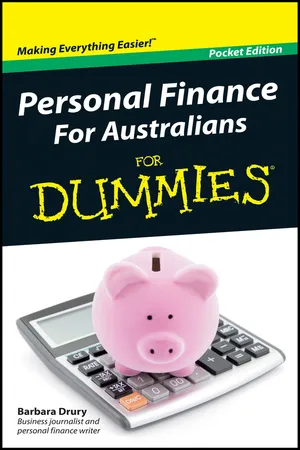Chapter 1
Taking Stock, Setting Goals and Chasing Rainbows
In This Chapter



One overarching theme as we move into the third millennium is the need to take control of your own destiny. And, increasingly, successful navigation of life’s twists and turns means getting a good grip on your personal finances.
Gone are the days of a straight march through life from childhood and education to a job, marriage, family and then retirement on a government pension. Now getting through life is more of a high-speed spin down the motorway, with a tantalising choice of destination at every major junction, and tollgates at regular intervals to make sure you pay as you go.
In recent years, the user-pays philosophy has been extended to everything from roads to tertiary education and health care. And, thanks to declining birth rates and an ageing population, successive governments have encouraged people to save for their own retirement via superannuation to avoid a skyrocketing welfare bill.
The nature of work is also changing. Rather than giving unswerving loyalty to one employer in return for benefits such as sick leave, paid holidays and a job for life, employees are jumping from job to job and taking responsibility for their own career paths.
As an ambitious young finance journalist starting out in Sydney, and later as the producer of a top business television program in London, I had no idea that one day I’d be living in a New South Wales coastal town, self-employed and writing from home surrounded by Lego and plastic dinosaurs. Employer-funded superannuation and an expense account are distant memories, but working in shorts and a T-shirt and being able to dash across the road to pick up the kids from school are more than compensation. In ten years’ time, I may be back in the city — or not.
In this chapter, I introduce some concepts to assist you in your quest to take charge of your personal finances. You need to find out where you are now and what you want to achieve so that you can plan where to go from here.
Finance Is a Personal Issue
In today’s world, personal lives seem more complicated than was the case in the past. People are more likely than their parents to divorce; they also have fewer children (or none at all), and many live in blended families or live alone.
Many of you probably combine several of these lifestyles over the years. With each new phase in your life, you may require different housing solutions. You may start off adult life sharing a rented flat with friends. Ten years later, you may be married and paying off a mortgage; in another ten, looking for a new, larger house to make room for a growing family.
As your housing changes, so do your needs. For example, you may decide on a few days a week child care for your youngest, and you may choose to hire a house cleaner to give you and your partner time to enjoy your leisure hours with the kids. All these decisions require your finances to be planned according to your needs.
Retirement also isn’t as simple as it used to be. The population is living longer and people expect more from retirement. These days, retirees are just as likely to buy a four-wheel drive and head off around Australia as they are to tend their roses and watch the grass grow. Needless to say, a fulfilling retirement requires years of saving and planning.
Money matters in the third millennium
Whichever way you look at it, money is a personal issue these days, in a way that it hasn’t been for previous generations. Everyday decisions about education, health care and retirement mean you have to manage your own financial affairs if you want more than a basic level of service. Little wonder that people today know more about their rights as consumers than they know about their rights as citizens.
And these days many people marry more than once, often raising more than one family, and women can expect to outlive their partners. For these reasons and many more I talk about in Chapter 3, you need to plan carefully to be financially prepared for the changes your life may bring.
Like the people you love most, money should be treated with care. You wouldn’t give your kids away for the world, so don’t throw your hard-earned money down the proverbial black hole. Careful, considered spending (budgeting) and careful, considered saving (investing) bring more financial success than risk-taking money ventures. (See Chapter 2 for how to set up a budget.)
Be positive about money management
Right now you’re probably thinking that all this talk of money and getting on top of your personal finances is too difficult, or just plain boring. Perhaps mild panic is setting in. Perhaps you’re tempted to push money matters back into the too-hard basket.
Before you give up, take a little time to reconsider. You’re reading this book, after all, so you’re already halfway to taking over the management of your money. Now, with a little more effort, you can start reaping rich rewards.

